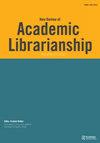Views of Academic Library Directors on Artificial Intelligence: A Representative Survey in Hungary
IF 2.3
Q2 INFORMATION SCIENCE & LIBRARY SCIENCE
引用次数: 8
Abstract
Abstract Artificial intelligence (AI) is a defining technology of the 21st century, creating new opportunities for academic libraries. The goal of this paper is to provide a much-needed analysis, interpreted in an international context, on what the leaders of academic libraries in East-Central Europe, and specifically in Hungary, think about AI and its implementation in a library setting. The survey shows that according to library directors AI is more of an opportunity for academic libraries than a threat, and it could provide support in all areas of library operation, including digitising, information service, and education. Findings indicate that a quarter of the Hungarian academic libraries surveyed use AI-supported solutions, mostly in the areas of information retrieval and data processing. Using Rogers (The diffusion of innovations. 5th ed. The Free Press, 2003) diffusion of innovation model, it may be projected that an explosive growth is to be expected in the use of AI in libraries.高校图书馆馆长对人工智能的看法——以匈牙利为代表的调查
人工智能(AI)是21世纪的一项决定性技术,为高校图书馆创造了新的机遇。本文的目的是提供一个急需的分析,在国际背景下解释,关于东欧,特别是匈牙利的学术图书馆的领导者,对人工智能及其在图书馆环境中的实施的看法。调查显示,根据图书馆馆长的说法,人工智能对学术图书馆来说与其说是威胁,不如说是机遇,它可以在图书馆运营的所有领域提供支持,包括数字化、信息服务和教育。调查结果表明,四分之一接受调查的匈牙利学术图书馆使用人工智能支持的解决方案,主要是在信息检索和数据处理领域。引用罗杰斯(创新的扩散)。第5版。自由出版社,2003年)创新模型的扩散,可以预测,人工智能在图书馆的使用将会出现爆炸式增长。
本文章由计算机程序翻译,如有差异,请以英文原文为准。
求助全文
约1分钟内获得全文
求助全文
来源期刊

New Review of Academic Librarianship
Social Sciences-Library and Information Sciences
CiteScore
3.40
自引率
0.00%
发文量
20
 求助内容:
求助内容: 应助结果提醒方式:
应助结果提醒方式:


